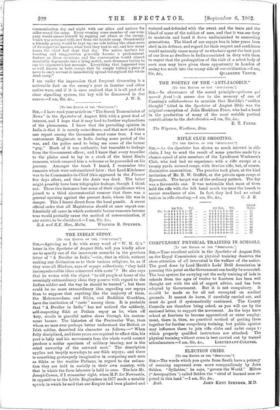THE INDIAN SEPOY.
[TO THE EDITOR OP THE "SPECTATOR."]
SIR,—Agreeing as I do with every word of " W. H. G.'s " letter in the Spectator of August 30th, will you kindly allow me to specify one of the inaccurate remarks in the previous letter of "A Dweller in India,"—viz., that in which, without making any distinction as to their various religions, he, as if they were all Hindoos, says of sepoys collectively, " they hold incomprehensible ideas connected with caste" ? He also says that he writes with the object " to rid people at home of the seemingly extraordinary ideas they possess with regard to the Indian soldier and the way he should be treated" ; but there could be no more extraordinary idea regarding our sepoys than to suppose that anything like the majority of them, the Mahommedans, and Sikhs, and Buddhist Goorkhas, have the institution of " caste " among them. It is probable that " A Dweller in India" has not noticed the soldierly, self-respecting Sikh or Pathan sepoy as lie, when off luty, strolls in graceful native dress thrOugh his canton- ment bazaar. The historian of the Peninsular War, than whom no man ever perhaps better understood the British or Irish soldier, described his character as follows :—" When fully disciplined, and three years are required to effect this, his port is lofty and-his movements free, the whole world cannot produce a nobler specimen of military bearing, nor is the mind unworthy of the outward man." The description applies not inaptly nowadays to our Sikh sepoys; and there is something grotesquely imaginative in comparing such men as Sikhs or the warlike Pathans, in regard to the estima- tion they are held in socially in their own country, with that in which the farm labourer is held in ours. The late Mr. Joseph Cowen, if I remember• right, when M.P. for Newcastle, in opposition to the Little Englanders in 1877 made a notable speech, in which he said that our Empire had been planted and
watered and defended with the sweat and the tears and the blood of some of the noblest of men, and that it was our duty to maintain and hand it down undiminished to succeeding generations. The blood of our sepoys has in later years been shed in its defence, and regard for their respect and confidence would naturally cause many of us who have spent the best part of our lives as dwellers in India associated in duty with them to regret that the prolongation of the visit of a select body of such men may have given them opportunity in London of seeing too niuch into the seamy side of our civilisation.—I am,






































 Previous page
Previous page